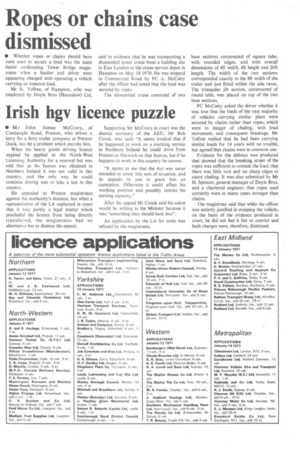Ropes or chains case dismissed
Page 29

If you've noticed an error in this article please click here to report it so we can fix it.
• Whether ropes or chains should have been used to secure a load was the main factor confronting Tower Bridge magistrates when a haulier and driver were appearing charged with operating a vehicle carrying an insecure load.
Mr K. Tolfree, of Hampton, who was employed by Doyle Bros (Hounslow) Ltd, said in evidence that he was transporting a dismantled tower crane from a building site in East London to the crane service depot in Hampton on May 18 1970. He was stopped in Commercial Road by PC A. McCatty after the officer had noted that the load was secured by ropes.
The dismantled crane consisted of two base sections constructed of square tube, with rounded edges, and with overall dimensions of 41t width, 4ft height and 26ft length. The width of the two sections corresponded exactly to the 8ft width of the trailer and just fitted within the side raves. The triangular jib section, constructed of round tube, was placed on top of the two base sections.
PC McCatty asked the driver whether it was true that the loads of the vast majority of vehicles carrying similar plant were secured by chains rather than ropes, which were in danger of chafing, with load movement, and consequent breakage. Mr Tolfree replied that he had been carrying similar loads for 14 years with no trouble, hut agreed That chains were in common use.
Evidence for the defence was produced that showed that the breaking strain of the ropes was sufficient to contain the load, that there was little rust and no sharp edges to cause chafing. It was also submitted by Mr H. Spencer, general manager of Doyle Bros, and a chartered engineer, that ropes used correctly were in many cases stronger than chains.
The magistrate said that while the officer was entirely justified in stopping the vehicle, on the basis of the evidence produced in court, he did not feel it fair to convict and both charges were, therefore, dismissed.




































































































